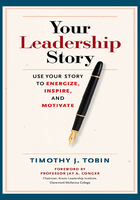
INTRODUCTION
What is your leadership story? More important, who is the author of your leadership story, you … or someone else? This book examines why it is important for you to be the author of your own leadership story and how you can best communicate its value.
Let me tell you about one of my clients. I'll call him Bob. Bob was a self-confident, solid technical expert in his field—it doesn't matter which one. Although he had been a manager for a while, his successes, he felt, were catching up with him. He was being asked to take on more duties. He had never felt the need to hire a coach before, but when we talked, here are some of the revealing concerns he confided in me.
• Am I taking on too many responsibilities, too much? How do I know when to say when?
• Can I handle an increased leadership role beyond my technical role?
• I am not sure that I handle every managerial or project leadership role as best as I should.
• Right now, I seem to be trying to balance my technical expertise with the managerial role and project leadership I am being asked to handle.
• What does it mean to be a leader—I mean, a real leader who can maintain that balance?
• How do you lead people who have been peers and friends and lunch buddies?
• What do I do myself, and what do I delegate, and when do I know the difference?
• How do I balance the new work roles and my personal life?
• Others have done it. I'm confident that I can, but I just need some definition. No one wants to be an example of the Peter Principle.
I've known and worked with thousands of Bobs. And Jills. As you go through the steps of this book—yes, it's about a practical process—we will visit with Bob as he faces each step. As a reader, you can get inside Bob's head or imagine that you are he. His story is quite typical of successful people who are taking on more responsibility and seek out someone like me.
Your leadership story is the collection of events, perspectives, and behaviors that represent who you are as a leader. It evolves from your unique experiences. Your leadership story is not like that of the person in the next department. Hers is different; neither story is right or wrong. Your leadership story communicates the message of identity: who you are as a leader, what you believe in, what drives you and defines you as a leader, and how you act.
If I don't know about you as a person, then I don't know about you as a leader. And whether preparing to be a leader for the first time or an established leader with many years of experience, every leader has a story.
All leadership stories should be dynamic. They are colorful depictions of events that provide a snapshot in time, yet they are works in progress. They energize, inspire, and motivate. Stories illustrate and reinforce key points and provide meaning and relevance. They help us to learn, impart a lesson, and communicate a message. Stories help us to make an emotional connection; and, told well, stories are compelling and memorable.
This book is about making your leadership story compelling and memorable. This is not about how to spit out a 15-second elevator speech.
I have been directly responsible for the development of thousands of leaders across a variety of industries and levels, and each leader has his or her own leadership story. Unfortunately, too often, leaders do not spend time thinking about or planning their story. It is given little thought or attention, and it is left to chance. Leaders who take a proactive role in understanding and communicating their story have increased capacity, stronger connections, greater self-awareness, greater authenticity, and better preparation to make routine and unanticipated decisions.
This book teaches you how to make your leadership story memorable by providing you with guidance for you to become the writer, director, and star of the story. Better yet, let's make it an epic.